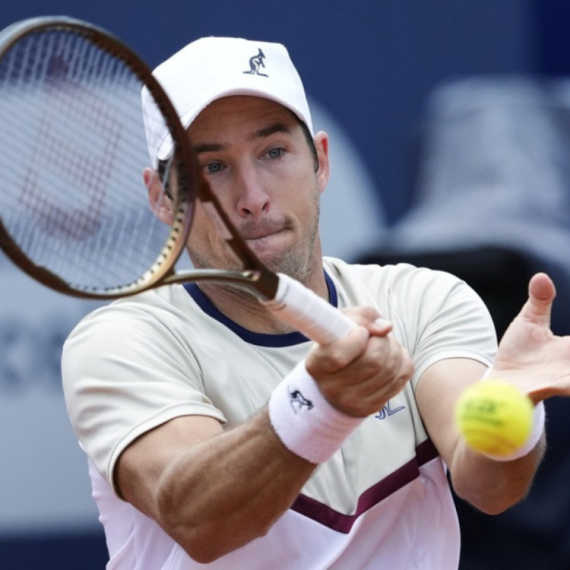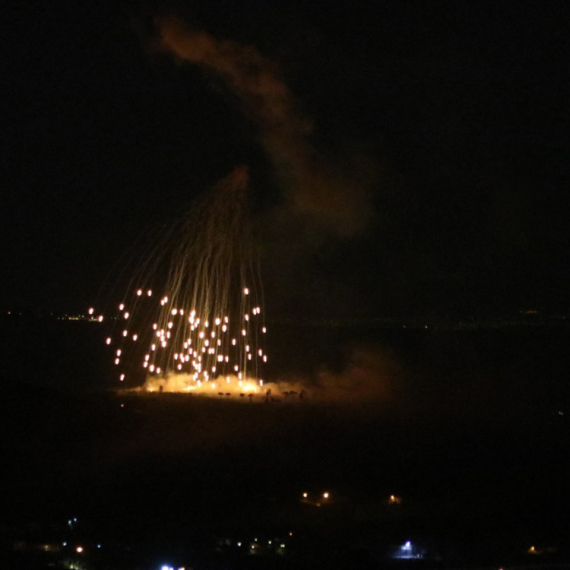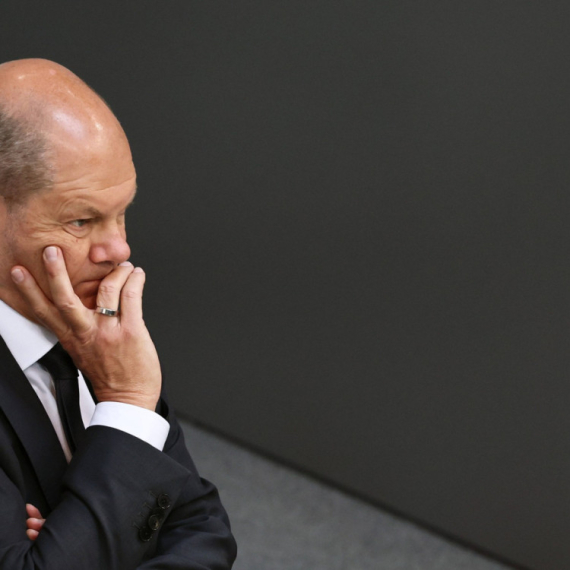Kosovo parties mull post-election coalition
Thursday, 15.11.2007.
21:28

Kosovo parties mull post-election coalition After an intensive three-week election campaign, Kosovo residents will vote for the first time in direct elections for members of the Kosovo Assembly and municipal mayors. However, since no single party is expected to win more than 35 percent of the vote, the formation of a new government may not be complete by December 10, the deadline by which the international Troika (the US, Russia and the EU) is to present its final report on final status talks between Belgrade and Pristina. It will likely take more than two parties to form a governing coalition since the two long-time rivals, the Democratic League of Kosovo, LDK, and the Democratic Party of Kosovo, PDK, will find it hard to reach a compromise with one another. The LDK has always enjoyed a substantial parliamentary presence, but since its founder, the late President Ibrahim Rugova, died in January 2006, the party’s prospects have faded. Two independent local polling companies, Compas and Index Kosova, attribute the LDK’s loss of its pre-eminent position to a split in the party in December 2006 and to the rising popularity among conventional voters of the Alliance for a New Kosovo, AKR, led by the controversial businessman, Behgjet Pacolli. A Compas survey released on October 19 shows that the PDK, led by Hashim Thaci, will win 32 percent of the vote while the LDK will remain at 29 percent. Pacolli’s AKR is expected to win 14 percent, while the Alliance for the Future of Kosovo, led by Ramush Haradinaj, will garner about 11 percent. The ORA party of Veton Surroi is expected to increase its share of the vote from the 6 percent it secured in 2004 to 8 percent, while the Democratic League of Dardania, an LDK splinter group led by Nexhat Daci, will remain on about 5 percent. Survey results published on November 6 by Index Kosova, a partner of Gallup International, produced similar results. The Index Kosova poll found that the PDK would get 31 percent, the LDK 29 percent, the AKR 16 percent and the AAK 9 percent in the upcoming election. Index Kosova predicts an 8-percent share of the vote for the LDD, and just 5 percent for the ORA, the minimum required for a party to enter parliament. The Kosovo Assembly has 120 seats, but parties compete for just 100 of these, as 20 seats are reserved for representatives of ethnic minorities. Ten of these reserved seats are for Serbs and 10 are for other non-Albanian communities. A total of 61 votes are needed for a government to be formed. Having won 45,5 percent of the vote in 2004, the LDK formed a government in coalition with the AAK and the AAK’s leader, Haradinaj, became prime minister. However, due to recent developments it is considered unlikely that the LDK will be able to repeat this arrangement. Berat Buzhala, an analyst from Pristina, believes that the AKR and the LDD will definitely be excluded from any government. “The AKR, because of Behgjet Pacolli’s background in Russia and Serbia, and the LDD because of Nexhat Daci’s clashes with foreign diplomatic offices,” Buzhala said. According to Buzhala, none of the larger parties can afford to build coalitions with these parties, especially at a time when the government will be responsible for Kosovo’s status, since both Pacolli and Daci are on poor terms with Western diplomats. The LDK has already eliminated the prospect of any post-electoral deal with the AKR since during the campaign its leaders have attacked what they described as Pacolli’s “murky” background. In an interview last week with Voice of America, Pacolli said negotiations with Serbia on Kosovo’s status should not be mediated by the international community and that they should be held in Kosovo and Serbia instead of on neutral soil. This statement was harshly and widely criticized by other politicians. “Pacolli’s statement that Kosovo-Serbia negotiations should not be undertaken through international mediation was crazy,” said Lutfi Haziri of the LDK, adding that Pacolli had “even tried to privatize companies through Belgrade.” Haziri, who is now deputy prime minister, accuses Pacolli of being nostalgic about his relations with Russia and Serbia during the Kosovo conflict in the late 1990s. Behxhet Pacolli has himself said that he does not believe that AKR participation would be necessary to form a government, even though opinion polls predicted that his party will come third in the election. “Our aim is to win as any votes as we can,” he told Balkan Insight last week. “If we end up in opposition I am prepared for that. If the AKR is not in government, however, that would be a big loss for Kosovo.” Meanwhile, the prospect of the LDK and the LDD getting together again continues to be ruled out as former colleagues continue to deal with tensions. LDK Vice President Eqrem Kryeziu says the party has benefited from the fact that Nexhat Daci is now fighting an election under another party banner. “There was a concept here of taking on institutional responsibilities as if they were private, and this was like a virus. Getting away from that concept has been beneficial for the LDK,” Kryeziu said. Daci was dismissed as Speaker of Parliament by the LDK in February 2006; he was accused of trying to treat the assembly as if it was his own property. He walked out of the LDK with several followers when new presidential elections within the party were organized in December 2006. Besa Gaxherri, a senior LDD member said any recombination with the LDK would be unsuccessful. “It’s a short time since we parted with the LDK and there is a bad trail for both parties’ members,” she said. In view of this fact, together with the latest polling figures, the PDK is expected to take the lead and build a new ruling coalition. Its leader, Hashim Thaci, has stressed this scenario during the campaign; he is currently the only candidate publicly seeking the position of prime minister. Thaci, a former leader of the Kosovo Liberation Army, KLA, has opened the party’s doors to a number of personalities from minor parties who were in danger of not making it into parliament, including Edita Tahiri of Kosovo’s Democratic Alternative, ADK and Kaqusha Jashari of the Social-Democratic Party, PSDK. Bajram Rexhepi, a former prime minister and a member of the PDK presidency, said it was an advantage that his party had remained in opposition during the previous mandate. “During those two to three years we saw where we had made mistakes and now we are more open,” Rexhepi said, adding that the party had decided to conduct a campaign that does not involve making accusations about other parties. “We saw that that wasn’t favorable for us in the past, and also people know what this government has done, so we don’t have to talk.” But analysts believe that this new approach by Thaci and his party may be a ploy aimed at bringing the PDK closer to the leader of the LDK, Kosovo’s president Fatmir Sejdiu. “This is a case of Thaci flirting with Sejdiu and vice versa,” said Mufail Limani, an analyst from Pristina. The parties have neither confirmed nor denied the possibility of forming a coalition. The LDK’s Eqrem Kryeziu said that, while there are naturally preferences, “as a serious political party we should respect every other party that wins legitimacy.” The PDK’s Bajram Rexhepi took the same line. “No party will win enough votes to govern on its own. We don’t have animosity toward any of the parties. We want a stable government,” he said. These two parties have been the biggest rivals in the past, and they have even traded accusations that members of one party have been responsible for killing members of the other. A Balkan Insight source in the LDK said the party is not as enthusiastic as the PDK is about the possibility of both parties forming a coalition. “I don’t know if that would be a good idea. They were our main rivals for a while and we could lose popularity in the future if we were to co-govern with them,” the source said. However, since the PDK seems unlikely to garner more than 35 percent of the vote, it is doubtful that Thaci can form a government without the LDK. Analysts argue that a strong government is needed in order to deal effectively with the status issue. Berat Buzhala says the most likely outcome is a broad coalition that includes the LDK and the PDK but also other parties that have taken part in the status negotiations. “It would be hard to leave the ORA and the AAK out,” Buzhala says. Daut Haradinaj, an AAK official and the brother of Ramush Haradinaj, believes that his brother may still become prime minister. “Ramush will be back,” he says. Ramush Haradinaj, an ex-KLA commander, was once considered the most powerful leader in Kosovo. The International Criminal Tribunal for former Yugoslavia, ICTY, indicted him for war crimes committed during the Kosovo conflict and his trial is still ongoing, but many believe that this has not affected his popularity in Kosovo. Daut Haradinaj argues that it will be impossible to form a government without the participation of the AAK. Analyst Mufail Limani does not expect the LDK will be willing to go back into a coalition with a party of former fighters, the AAK and PDK but says that “The LDK and the PDK would create a very stable government.” As the election date approaches, an LDK-PDK coalition remains an option. Perhaps a more likely outcome is a coalition that includes these two parties the AAK and Veton Surroi’s ORA. Petrit Selimi, another analyst, believes that nothing will be totally clear before the final results are announced. “What will happen to the LDK is the million-dollar question,” he says. Artan Mustafa is a journalist with Kosovo’s daily Express and a contributor to Balkan Insight. Balkan Insight is BIRN’s online publication. They won't be voting: Self-Determination activists burn mock ballot papers and urge boycott (FoNet) On November 17, Kosovo residents will vote for representatives who are likely to be in office when the territory attains a new political status. Artan Mustafa Since no single party is expected to win more than 35 percent of the vote, the formation of a new government may not be complete by December 10, the deadline by which the international Troika is to present its final report on final status talks between Belgrade and Pristina.
Kosovo parties mull post-election coalition
After an intensive three-week election campaign, Kosovo residents will vote for the first time in direct elections for members of the Kosovo Assembly and municipal mayors.However, since no single party is expected to win more than 35 percent of the vote, the formation of a new government may not be complete by December 10, the deadline by which the international Troika (the US, Russia and the EU) is to present its final report on final status talks between Belgrade and Priština.
It will likely take more than two parties to form a governing coalition since the two long-time rivals, the Democratic League of Kosovo, LDK, and the Democratic Party of Kosovo, PDK, will find it hard to reach a compromise with one another.
The LDK has always enjoyed a substantial parliamentary presence, but since its founder, the late President Ibrahim Rugova, died in January 2006, the party’s prospects have faded.
Two independent local polling companies, Compas and Index Kosova, attribute the LDK’s loss of its pre-eminent position to a split in the party in December 2006 and to the rising popularity among conventional voters of the Alliance for a New Kosovo, AKR, led by the controversial businessman, Behgjet Pacolli.
A Compas survey released on October 19 shows that the PDK, led by Hashim Thaci, will win 32 percent of the vote while the LDK will remain at 29 percent.
Pacolli’s AKR is expected to win 14 percent, while the Alliance for the Future of Kosovo, led by Ramush Haradinaj, will garner about 11 percent.
The ORA party of Veton Surroi is expected to increase its share of the vote from the 6 percent it secured in 2004 to 8 percent, while the Democratic League of Dardania, an LDK splinter group led by Nexhat Daci, will remain on about 5 percent.
Survey results published on November 6 by Index Kosova, a partner of Gallup International, produced similar results.
The Index Kosova poll found that the PDK would get 31 percent, the LDK 29 percent, the AKR 16 percent and the AAK 9 percent in the upcoming election.
Index Kosova predicts an 8-percent share of the vote for the LDD, and just 5 percent for the ORA, the minimum required for a party to enter parliament.
The Kosovo Assembly has 120 seats, but parties compete for just 100 of these, as 20 seats are reserved for representatives of ethnic minorities. Ten of these reserved seats are for Serbs and 10 are for other non-Albanian communities. A total of 61 votes are needed for a government to be formed.
Having won 45,5 percent of the vote in 2004, the LDK formed a government in coalition with the AAK and the AAK’s leader, Haradinaj, became prime minister.
However, due to recent developments it is considered unlikely that the LDK will be able to repeat this arrangement. Berat Buzhala, an analyst from Priština, believes that the AKR and the LDD will definitely be excluded from any government.
“The AKR, because of Behgjet Pacolli’s background in Russia and Serbia, and the LDD because of Nexhat Daci’s clashes with foreign diplomatic offices,” Buzhala said.
According to Buzhala, none of the larger parties can afford to build coalitions with these parties, especially at a time when the government will be responsible for Kosovo’s status, since both Pacolli and Daci are on poor terms with Western diplomats.
The LDK has already eliminated the prospect of any post-electoral deal with the AKR since during the campaign its leaders have attacked what they described as Pacolli’s “murky” background.
In an interview last week with Voice of America, Pacolli said negotiations with Serbia on Kosovo’s status should not be mediated by the international community and that they should be held in Kosovo and Serbia instead of on neutral soil.
This statement was harshly and widely criticized by other politicians.
“Pacolli’s statement that Kosovo-Serbia negotiations should not be undertaken through international mediation was crazy,” said Lutfi Haziri of the LDK, adding that Pacolli had “even tried to privatize companies through Belgrade.”
Haziri, who is now deputy prime minister, accuses Pacolli of being nostalgic about his relations with Russia and Serbia during the Kosovo conflict in the late 1990s.
Behxhet Pacolli has himself said that he does not believe that AKR participation would be necessary to form a government, even though opinion polls predicted that his party will come third in the election.
“Our aim is to win as any votes as we can,” he told Balkan Insight last week. “If we end up in opposition I am prepared for that. If the AKR is not in government, however, that would be a big loss for Kosovo.”
Meanwhile, the prospect of the LDK and the LDD getting together again continues to be ruled out as former colleagues continue to deal with tensions.
LDK Vice President Eqrem Kryeziu says the party has benefited from the fact that Nexhat Daci is now fighting an election under another party banner.
“There was a concept here of taking on institutional responsibilities as if they were private, and this was like a virus. Getting away from that concept has been beneficial for the LDK,” Kryeziu said.
Daci was dismissed as Speaker of Parliament by the LDK in February 2006; he was accused of trying to treat the assembly as if it was his own property. He walked out of the LDK with several followers when new presidential elections within the party were organized in December 2006.
Besa Gaxherri, a senior LDD member said any recombination with the LDK would be unsuccessful.
“It’s a short time since we parted with the LDK and there is a bad trail for both parties’ members,” she said.
In view of this fact, together with the latest polling figures, the PDK is expected to take the lead and build a new ruling coalition. Its leader, Hashim Thaci, has stressed this scenario during the campaign; he is currently the only candidate publicly seeking the position of prime minister.
Thaci, a former leader of the Kosovo Liberation Army, KLA, has opened the party’s doors to a number of personalities from minor parties who were in danger of not making it into parliament, including Edita Tahiri of Kosovo’s Democratic Alternative, ADK and Kaqusha Jashari of the Social-Democratic Party, PSDK.
Bajram Rexhepi, a former prime minister and a member of the PDK presidency, said it was an advantage that his party had remained in opposition during the previous mandate.
“During those two to three years we saw where we had made mistakes and now we are more open,” Rexhepi said, adding that the party had decided to conduct a campaign that does not involve making accusations about other parties.
“We saw that that wasn’t favorable for us in the past, and also people know what this government has done, so we don’t have to talk.”
But analysts believe that this new approach by Thaci and his party may be a ploy aimed at bringing the PDK closer to the leader of the LDK, Kosovo’s president Fatmir Sejdiu.
“This is a case of Thaci flirting with Sejdiu and vice versa,” said Mufail Limani, an analyst from Pristina.
The parties have neither confirmed nor denied the possibility of forming a coalition.
The LDK’s Eqrem Kryeziu said that, while there are naturally preferences, “as a serious political party we should respect every other party that wins legitimacy.”
The PDK’s Bajram Rexhepi took the same line. “No party will win enough votes to govern on its own. We don’t have animosity toward any of the parties. We want a stable government,” he said.
These two parties have been the biggest rivals in the past, and they have even traded accusations that members of one party have been responsible for killing members of the other.
A Balkan Insight source in the LDK said the party is not as enthusiastic as the PDK is about the possibility of both parties forming a coalition.
“I don’t know if that would be a good idea. They were our main rivals for a while and we could lose popularity in the future if we were to co-govern with them,” the source said.
However, since the PDK seems unlikely to garner more than 35 percent of the vote, it is doubtful that Thaci can form a government without the LDK.
Analysts argue that a strong government is needed in order to deal effectively with the status issue.
Berat Buzhala says the most likely outcome is a broad coalition that includes the LDK and the PDK but also other parties that have taken part in the status negotiations.
“It would be hard to leave the ORA and the AAK out,” Buzhala says.
Daut Haradinaj, an AAK official and the brother of Ramush Haradinaj, believes that his brother may still become prime minister.
“Ramush will be back,” he says. Ramush Haradinaj, an ex-KLA commander, was once considered the most powerful leader in Kosovo. The International Criminal Tribunal for former Yugoslavia, ICTY, indicted him for war crimes committed during the Kosovo conflict and his trial is still ongoing, but many believe that this has not affected his popularity in Kosovo.
Daut Haradinaj argues that it will be impossible to form a government without the participation of the AAK.
Analyst Mufail Limani does not expect the LDK will be willing to go back into a coalition with a party of former fighters, the AAK and PDK but says that “The LDK and the PDK would create a very stable government.”
As the election date approaches, an LDK-PDK coalition remains an option. Perhaps a more likely outcome is a coalition that includes these two parties the AAK and Veton Surroi’s ORA.
Petrit Selimi, another analyst, believes that nothing will be totally clear before the final results are announced.
“What will happen to the LDK is the million-dollar question,” he says.
Artan Mustafa is a journalist with Kosovo’s daily Express and a contributor to Balkan Insight. Balkan Insight is BIRN’s online publication.













































Komentari 4
Pogledaj komentare